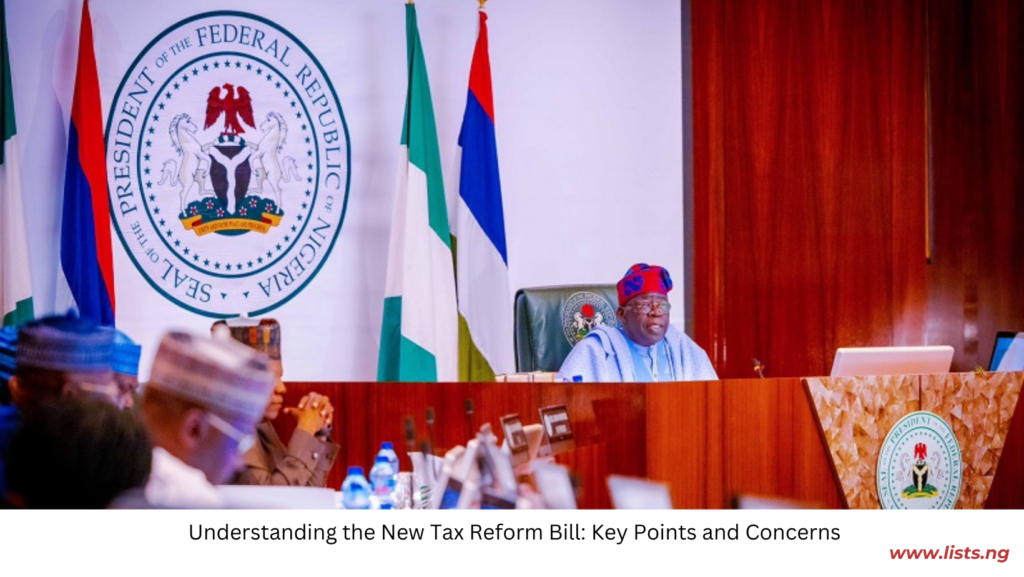Nigeria’s proposed 2024 Tax Reform Bill aims to overhaul outdated tax systems, addressing inefficiencies and promoting fairness. Central to the debate is the Nigeria Tax Bill, which changes how Value Added Tax (VAT) is shared, allocating 60% based on derivation, favoring states like Lagos and Rivers with higher contributions. While supporters argue the reforms will boost local economies and ease burdens on low-income earners and small businesses, critics worry they could widen regional disparities.
This listicle breaks down the reforms, their potential impact, and the concerns driving the heated conversations.
- Redistributing VAT Revenues
Proposal: The bill proposes a new VAT sharing formula—10% for the federal government, 55% for state governments, and 35% for local governments, with 60% derivation for the originating state.
Supporters Say: This ensures fairness, incentivizes economic competitiveness among states, and resolves ongoing litigation between state and federal governments.
Critics Worry: States with less economic activity fear reduced revenues, potentially destabilizing their ability to meet obligations.
- VAT Exemptions for Essentials
Proposal: Zero VAT on exports, food, healthcare, education, rent, and renewable energy.
Supporters Say: This reduces inflationary pressures, boosts public welfare, and enhances Nigeria’s global trade competitiveness.
Critics Worry: The loss of VAT revenue on essential goods may create gaps in funding critical public services.
- Tax Relief for Low-Income Earners
Proposal: Workers earning ₦800,000 annually or less and minimum wage earners will be exempt from personal income tax.
Supporters Say: This measure increases disposable income, reduces inequality, and alleviates economic burdens for over 90% of workers.
Critics Worry: The exemptions could reduce the revenue available for social programs, relying heavily on other tax sources.
- Incentives for Small Businesses
Proposal: Businesses with turnovers under ₦50 million or assets under ₦250 million are exempt from taxes.
Supporters Say: MSMEs, contributing nearly half of Nigeria’s GDP and 87% of employment, will grow under reduced tax burdens.
Critics Worry: Larger businesses may face increased pressure to offset these exemptions, impacting investment and growth.
- Reduction of Multiple Taxation
Proposal: Company income tax reduced from 30% to 25% by 2026, replacing several taxes with a 4% development levy, dropping to 2% by 2030.
Supporters Say: Simplifies tax obligations, lowers corporate tax rates, and supports educational initiatives through the Nigerian Education Loan Fund.
Critics Worry: The transitional levies may still burden businesses until the reduction takes full effect.
Reaction: Lawmakers Clash Over Tax Reform Bills
The House of Representatives descended into chaos during Tuesday’s plenary when Akin Rotimi, representing Ekiti North, referenced the controversial tax reform bills. While moving a motion unrelated to the tax bills, Rotimi’s casual mention of Ekiti’s unanimous endorsement sparked an uproar among his colleagues.
Attempts by Speaker Tajudeen Abbas to calm the chamber were futile, as lawmakers rejected Rotimi’s remarks, shouting “no, no, no.” Rotimi later retracted his comments, apologized, and refocused on the order paper, but the incident underscored the sensitive nature of the tax reform debate.
The bills, opposed by the Northern Governors’ Forum and criticized by figures like Rabiu Kwankwaso, remain polarizing, with concerns about regional disparities and fair implementation dominating the discourse.
Broader Concerns
Subnational Fiscal Challenges: States heavily reliant on federal allocations may struggle to maintain services without robust internal revenue mechanisms.
Implementation Risks: Harmonizing tax collection across tiers of government could face bureaucratic delays, reducing effectiveness.
Economic Pressure on Larger Entities: Multinationals and large corporations may feel overburdened, potentially discouraging foreign investments.
Public Distrust: Skepticism about whether tax revenues will be transparently used for public good lingers.
Wrapping Up
The Tax Reform Bills represent a bold step towards economic reform, but they carry substantial risks if not carefully implemented. Proponents argue these reforms are critical for Nigeria’s long-term fiscal stability and equitable growth. Opponents and observers highlight the potential adverse effects on state finances, businesses, and citizens if the proposed measures falter. A balanced, inclusive approach involving all stakeholders is essential to address these concerns and ensure the reforms deliver on their promises.



